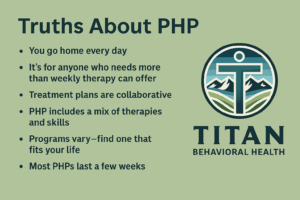You just got a diagnosis. Maybe you half-expected it. Maybe it felt like a wave you didn’t see coming, knocking you off balance before you could even take a breath. Either way, the “what ifs” start stacking up fast:
What will treatment be like? Will I lose control over my choices? Will they make me take medication I’m not ready for?
Somewhere in the conversation, someone mentions a Partial Hospitalization Program—or “PHP” for short—and your mind jumps to worst-case scenarios.
Here’s the truth: PHP isn’t a locked ward. It’s not a punishment. And it’s definitely not a one-size-fits-all situation. A good PHP meets you where you are and helps you take the next steps toward stability and strength.
Let’s look at some of the biggest myths about PHP and replace them with truths that can help you feel more confident about your options.
Myth: PHP Means I’ll Lose My Freedom
Truth: You go home every day.
One of the biggest misconceptions about PHP is that you’ll be “stuck” somewhere. In reality, PHP means you attend structured treatment during the day and return home—or to a supportive living environment—each evening.
You keep your own space. You can sleep in your own bed. You can share dinner with your family or your roommates. That ability to go home is a big part of why PHP works for many people—it gives you the chance to practice skills in your real-life environment right away.
Myth: PHP Is Only for People in Crisis
Truth: It’s for anyone who needs more than weekly therapy can offer.
Yes, PHP can be lifesaving during a crisis, but it’s also a proactive step for people who are noticing early warning signs:
- Symptoms are getting louder or harder to manage.
- Daily life feels heavier and harder to navigate.
- You’re worried about relapse or sliding backwards.
Think of PHP like a “booster shot” for your mental health—structured, concentrated support before things spiral further. Many people choose PHP before hitting a breaking point.
Myth: They’ll Force Me to Take Medication
Truth: Treatment plans are collaborative.
If you’re newly diagnosed and hesitant about medication, you’re not alone. In PHP, medication is one option, not the only option.
You’ll work with a treatment team—including psychiatrists, therapists, and nurses—who will explain your choices, answer questions, and listen to your concerns. You decide what’s right for you, and you can revisit that decision as you go.
One client told us, “I thought they’d hand me a bottle and say ‘take this or leave.’ Instead, they asked what I was scared of, and we talked through it.”

Myth: I’ll Be Stuck in Groups All Day
Truth: PHP includes a mix of therapies and skills.
Group therapy is part of the structure, but it’s not the whole day. A well-rounded PHP schedule can include:
- Individual therapy to dig into personal challenges.
- Psychoeducation sessions to understand symptoms and triggers.
- Skills training for stress management, communication, and relapse prevention.
- Creative or experiential therapies like art, mindfulness, or movement.
The variety keeps things engaging and gives you multiple ways to process what you’re going through.
Myth: PHP Is the Same Everywhere
Truth: Programs vary—find one that fits your life.
Not all PHPs are created equal. The right program will adapt to your diagnosis, preferences, and daily reality.
At Titan Behavioral Health, we serve people in Las Vegas and nearby communities like Henderson and North Las Vegas with treatment plans that meet each person where they are. That might mean adjusting the schedule for someone working part-time, incorporating specific therapies, or adding more one-on-one sessions for someone who’s nervous in groups.
Myth: I’ll Have to Commit for Months and Months
Truth: Most PHPs last a few weeks.
While every situation is different, PHPs typically run for 2 to 6 weeks. The goal is to give you enough time to stabilize, learn skills, and make a plan for next steps—without feeling like treatment will take over your life indefinitely.
When you “graduate” from PHP, you might step down to an Intensive Outpatient Program (IOP) or weekly therapy, depending on your progress and needs.
Myth: PHP Will Take Over My Life
Truth: It’s designed to help you live it better.
The point of PHP isn’t to trap you in a treatment cycle—it’s to help you function in your life with more confidence, clarity, and stability.
It’s like going to a mental health gym: you show up, do the work, build strength, and take those gains back into your daily life.
FAQ: Common Questions About PHP
Do I have to be sober before starting PHP?
Not always, but you do need to be medically stable. If you need detox first, the team will help coordinate that.
Can I work while in PHP?
Some people do part-time work, but the program’s daytime schedule can make full-time work difficult.
What if I miss a day?
Consistency matters. If you have to miss, the team will help you catch up, but regular attendance is key to progress.
Will my family be involved?
Many PHPs offer family therapy or education sessions. This can help your support system understand your challenges and how to help.
How will I know it’s working?
You might notice small shifts first—more consistent routines, fewer crisis moments, better communication. Your treatment team will also review your progress regularly.
The Bottom Line
A Partial Hospitalization Program is not about taking control away from you—it’s about giving you tools, structure, and support to take your life back. If you’ve been avoiding treatment because of the myths, know this: PHP can be one of the most empowering steps you’ll ever take.
Ready to Take the Next Step?
Call (888) 976-8457 or visit our Partial Hospitalization Program services in Las Vegas, Nevada to learn more. Whether you’re feeling uncertain, hopeful, or somewhere in between, our team can help you find your next step forward.

